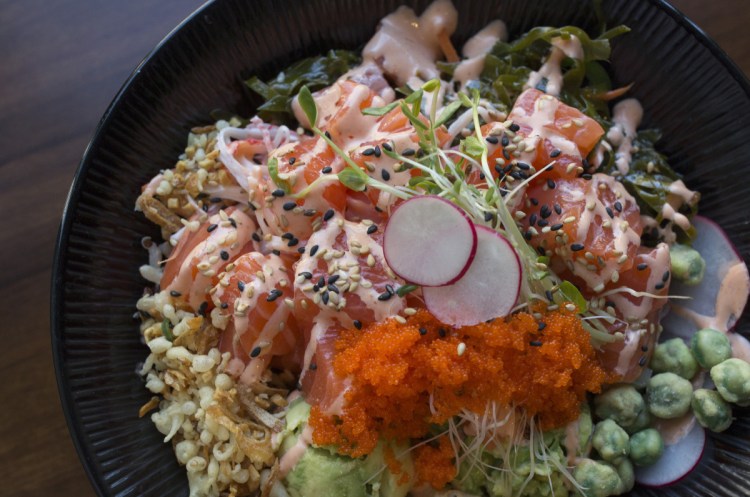Poké isn’t what it used to be.
The Hawaiian dish was once a simple preparation of two kinds of seafood exclusively – tuna or octopus – taken directly from the ocean. To make it, all you had to do was top raw, cubed fish with shreds of pounded limu (seaweed), oily candlenut meat and a dusting of local salt tinted ladybug-red by volcanic minerals.
Over time, poké has taken on a more globalized identity, one patterned on that of its Asian cousins. From Korean hwe dup bap, it borrows sweet and spicy saucing, and from Japanese chirashizushi, a diversity of fish as well as a layer of sticky rice that gives it heft.
Contemporary poké is an international dish, and it’s time we start treating it that way.
It seems only fitting that, in our modest metropolitan area, we have four poké restaurants whose chefs’ heritage is not Hawaiian, but Chinese, Thai – and with the recent arrival of Crunchy Poké Bar in Portland – Vietnamese.
However, owner and chef Tien Nguyen’s style of poké tilts towards the Japanese, reflecting his training as a sushi chef with the Whole Foods organization. Indeed, until just a few weeks ago, he still ran Genji Sushi Bar, the sushi, sashimi and ramen restaurant inside the Somerset Street supermarket.
Crunchy Poké’s explicit focus on healthy, local ingredients and sustainability also seems inspired by Nguyen’s time as a Whole Foods employee. “We try to be as Earth-friendly as possible,” he said. “We use compostable bowls and straws, we don’t sell bluefin tuna, which is endangered, and we donate 2 percent of our net sales every quarter to the Barbara Bush Children’s Hospital.”
Even the décor of the Fore Street storefront (the former home of East End Cupcakes) is intended to signal the casual, mostly take-out restaurant’s mission through grainy, unpainted wood panels and flashes of green, “the colors of the Earth,” in Nguyen’s words.
Perhaps no dish embodies Crunchy Poké’s ethos better than its seaweed salad ($5.99). Normally a wakame-based, dashi-and-vinegar-seasoned side that Japanese restaurants import through one of a few corporate distributors, seaweed salad is usually the same everywhere you go, from Boise to Boston. Here, however, Nguyen serves a shredded, farm-raised kelp salad from Ocean Approved in Saco, one sweetened only by shaved carrots. The Maine version has a snappier texture than most seaweed salads do, but with no soy and little acid, the dish lacks flavor. It’s a little like eating crunchy garden clippings.
Fortunately, the restaurant’s signature dish is significantly better. Especially the salmon poké ($12), served on a sweet, nutty blend of brown rice and quinoa, along with peppery radish, crab salad, jalapeño, and a generous spoonful of shocking-orange masago (capelin roe). Its creamy, Japanese-mayonnaise sauce is tart and savory enough to perk up otherwise underseasoned vegetables, yet does not overwhelm the flavor of the gently seasoned fish.
Nguyen sources his salmon from the Faroe Islands, then dry-brines it in Himalayan sea salt before employing what he calls a “super freezer” to bring the temperature of the raw fish down below -50 F for three days. It is remarkably rare to find a fast-casual sushi or poké restaurant that does its own (often costly and time-consuming) parasite reduction. “But we believe that if we do it by hand, it (the fish) just comes out better,” Nguyen explained.
Not all the seafood at Crunchy Poké requires such intense pre-treatment. Meat for the Maine lobster poké ($15) is steamed fresh every day or two and (as a bonus) comes with a few thousand fewer food miles. Served with sweet onion, pre-bought calamari salad, corn and red cabbage, it is probably the best version of shellfish poké I have tasted in the state.

The lunch rush at Crunchy Poké in Portland. Staff photo by Brianna Soukup
What makes it that may well be the lashings of extra-tangy, soy-based house poké sauce that flavor not only the toppings, but the un-vinegared short-grain white rice beneath.
In the unagi sushi burrito ($12) – pulled as taut as an Ariana Grande ponytail – that same white rice does not get the same drenching and winds up bland and pasty, even with chunks of mango and crispy fried onion valiantly performing CPR in the background. The over-grilled, dry unagi doesn’t help matters.
Flavor equilibrium is also off in the matcha boba ($4), where too much green tea powder gets blended with whole milk and ice – nothing more. For the first 15-20 minutes, it is bitter and bracing, nearly undrinkable… until the brown-sugar-and-honey-soaked tapioca pearls eventually leach their sugars into the drink. Then, as if by magic, it becomes a different beverage, almost like an espresso-based milkshake. If you’re willing to wait, it’s worth a gamble.
So too, the tonkotsu ramen ($12), a hot bowl of super-elastic egg noodles that seems out-of-place in a raw seafood restaurant, even more so when you realize that none of the components is made in-house, from smoky pork broth seasoned with mayu (black garlic oil), to slices of mirin-and-soy marinated, slow-cooked chashu pork. But against all odds, it all works. I may never understand how an indulgent, carb-heavy bowl of brothy pasta and pork belly fits into Crunchy Poké’s healthy-eating mission (or its commitment to sustainability and locavorism) but that may not matter. It’s a great bowl of soup – yet another postmodern twist in the wacky evolution of poké restaurants in America.
Andrew Ross has written about food and dining in New York and the United Kingdom. He and his work have been featured on Martha Stewart Living Radio and in The New York Times. He is the recipient of two 2018 Critic’s Awards from the Maine Press Association. Contact him at:
andrewross.maine@gmail.com
Twitter: AndrewRossME
Send questions/comments to the editors.



Comments are no longer available on this story